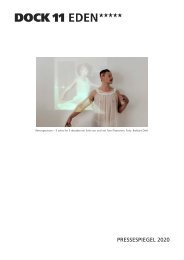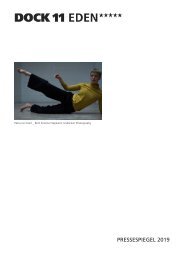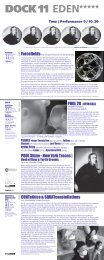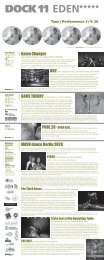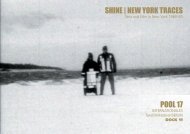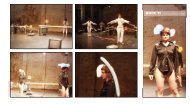Pressespiegel 2017
Sie wollen auch ein ePaper? Erhöhen Sie die Reichweite Ihrer Titel.
YUMPU macht aus Druck-PDFs automatisch weboptimierte ePaper, die Google liebt.
DOCK 11 PRESSESPIEGEL <strong>2017</strong><br />
Signoriello confesses to Alejandro Notas that she has kissed others. “Forgive me.” she demands of<br />
him. She drags him along in her game of love and lust. All along Notas retains a strong and steady<br />
energy, both unwilling to show his wounds or any other emotion. Signoriello slaps him, Still no response.<br />
He stands for a sort of man fighting to remain in control and to not be overcome by his emotions.<br />
This is until he is brought to a heart-wrenching solo towards the end of the work where he is<br />
toss to the ground until a response is practically beaten out of him.<br />
Ronja Häring also takes a comedic stance as she recites her abridged version of Erich Kästner’s poem<br />
Sachliche Romanze. She speaks matter-of-factly about the irony of love and the couple’s unwillingness<br />
to accept that they had fallen out of love. She compares their loss of love to that of a sock, as if<br />
human emotions can be lost like an article of laundry.<br />
As Austin Fagan takes center stage, he reintroduces the game, this time requesting opinions from the<br />
others. “What do you think about me?” He asks over and over until the others reply “Why do you<br />
care?” Fagan continues into a moving monologue about purpose and identity. He compares himself<br />
to the clothes that he wears every day. They become old and tear, and when he patches them, all<br />
anyone sees are the patches. It’s like spending all his money and energy chasing his dreams only to<br />
run out of money and not be any closer. “It’s like hitting yourself in the face with a frying pan… like<br />
working on personal development to strengthen your relationships, but no one cares…” or “choosing<br />
to believe you’re happy when you know you’re not.”<br />
All the performers retreat to a moment of isolation where they all begin speaking in their own language.<br />
Yuri Shimaoka’s individual monologue develops into a gesturing phrase which moves her to her<br />
knees. It is a phrase of suppression and guilt. Her movements are simple but executed from a deep<br />
spirituality with strength and honesty.<br />
The piece slowly seems to spiral into a place of hopelessness until they break into singing “L-O-V-E.”<br />
I almost believe the words they are singing “love was made for me and you.” However, there is a residue<br />
of irony and irresolution. As the work come to a closure, the weight and meaning of love takes<br />
hold. “I felt love come out of my belly… I will never leave you… I love you.” Words of desperation.<br />
Michal Hirsch surprises the audience. The mature performer who had remained steady and calm<br />
through the performance announces “Now it’s my turn!” She steals our attention with her wisdom<br />
and spirituality and speaks with an urgency. She urges the performers much younger than she to not<br />
lose hope. Her movement is reckless and childlike. She has remained free regardless of the burdens of<br />
love. The other six try to exit the stage but she runs before them insisting they stay.<br />
Though they remain they have lost the playfulness they began with. They have grown tired of playing<br />
the game of love because they have too often been on the receiving end, used and empty. Love, lost,<br />
isolation, community, purpose, identity, fear, anger, and healing. However, it is the laughs along the<br />
way that enriches the experience.







